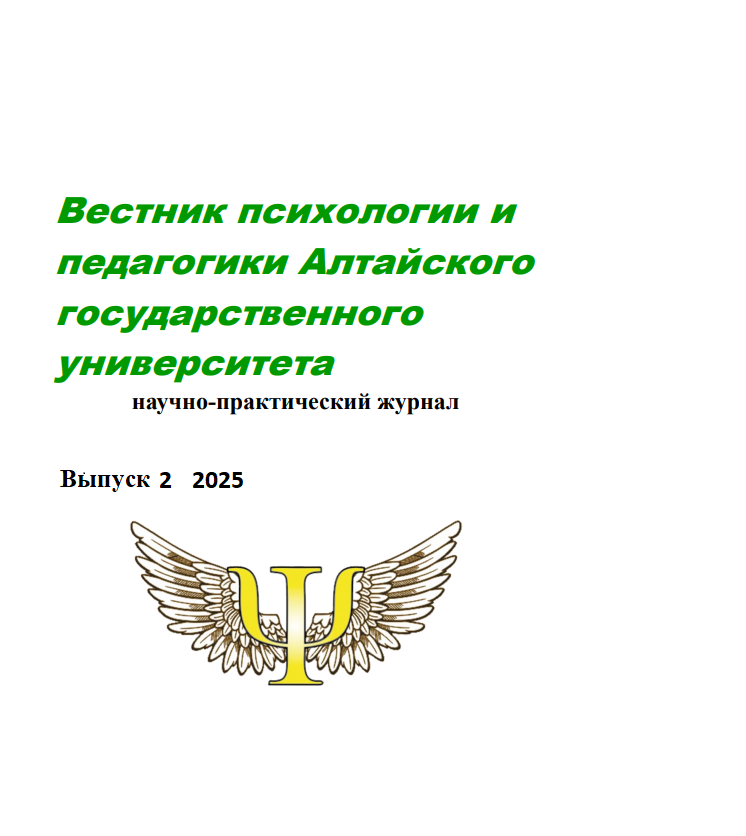SOCIO-PSYCHOLOGICAL DETERMINANTS OF THE FORMATION OF AN EMPATHIC PERSONALITY CULTURE IN SOCIONOMIC PROFESSIONS
УДК 155.9
Abstract
In modern science, the formation of an empathic personality culture in socionomic professions is considered as an integral component of professionalism and the humanistic orientation of professional activity. The article is devoted to the analysis of socio-psychological determinants contributing to the development of empathic culture in such fields as pedagogy, medicine and social work. The results of research conducted by Russian and foreign authors are used as a theoretical and methodological basis. On this basis, the structural and substantive aspects of empathy are highlighted, the mechanisms and conditions of its formation are revealed, and the relationship between empathy and professional competence is emphasized. This work is an attempt to systematize existing approaches to understanding empathic culture, to show its importance for socionomic specialties and to identify possible prospects for further research in this field.
Purpose: to consider the main socio-psychological determinants of the formation of an empathic culture of personality, to show their interrelation, and also to illustrate how different professional contexts (pedagogy, medicine, social work) influence the process of developing empathic skills.
Downloads
References
Дмитриева А.Г., Лаврентьева Е.А. Анализ значимости эмпатии в педагогической деятельности преподавателя вуза // Концепт. 2021. № 6. URL: https://cyberleninka.ru/article/n/analiz-znachimosti-empatii-v-pedagogicheskoy-deyatelnosti-prepodavatelya-vuza
Жданова Л.Г., Арнгольд С.А. Особенности проявлений эмпатии у медицинских работников // АНИ: педагогика и психология. 2014. №3 (8). URL: https://cyberleninka.ru/article/n/osobennosti-proyavleniy-empatii-u-meditsinskih-rabotnikov
Карпова Ю.М. Социально-психологические технологии развития эмпатии социальных работников // Вестник магистратуры. 2019. №1-2 (88). URL: https://cyberleninka.ru/article/n/sotsialno-psihologicheskie-tehnologii-razvitiya-empatii-sotsialnyh-rabotnikov
Рзаева Ж.В. Особенности аффективного компонента эмпатии у будущих педагогов-психоогов // Научные труды Республиканского института высшей школы. Исторические и психолого-педагогические науки. 2018. № 18-3. С. 3-10. URL: https://elibrary.ru/item.asp?id=35665231
4 Сердакова К.Г., Маджуга А.Г., Шабыкина В.А. Формирование эмпатической культуры в системе профессиональной подготовки специалистов социономных профессий. В сборнике: Этнопедагогика в контексте современной культуры. Сборник научных трудов по материалам Международной научно-практической конференции. Ответственный редактор Л.Б. Абдуллина. 2018. С. 323–328. URL: https://www.elibrary.ru/item.asp?id=37226953.
Сутурина Ю.В. Роль эмпатии и алекситимии в педагогической деятельности преподавателей вуза // Гуманитарный вектор. Серия: Педагогика, психология. 2010. № 2(22). С. 75–79. URL: https://cyberleninka.ru/article/n/rol-empatii-i-aleksitimii-v-pedagogicheskoy-deyatelnosti-prepodavateley-vuza
Шагивалеева Г.Р. Развитие эмпатии как профессионально важного качества будущего учителя // Психология. Историко-критические обзоры и современные исследования. 2020. Т. 9. № 5А. С. 7–14. 10.34670/AR.2020.67.40.001
Berkovich I. Conceptualisations of empathy in K-12 teaching: a review of empirical research // Educational Review. 2020. Vol. 72. P. 547–566. URL: https://cris.openu.ac.il/en/publications/conceptualisations-of-empathy-in-k-12-teaching-a-review-of-empiri
King S.H. The Structure of Empathy in Social Work Practice // Journal of Human Behavior in the Social Environment. 2011. Vol. 21(6). P. 679–695. URL: https://doi.org/10.1080/10911359.2011.583516.
Yu C.C., Tan L., Le M.K. et al. The development of empathy in the healthcare setting: a qualitative approach // BMC Med Educ. 2022. Vol. 22. P. 245.
References:
Dmitrieva A. G., Lavrent'eva E. A. Analiz znachimosti jempatii v pedagogicheskoj dejatel'nosti prepodavatelja vuza. Koncept. 2021. No 6. URL: https://cyberleninka.ru/article/n/analiz-znachimosti-empatii-v-pedagogicheskoy-deyatelnosti-prepodavatelya-vuza
Zhdanova L. G., Arngol'd S. A. Osobennosti projavlenij jempatii u medicinskih rabotnikov. ANI: pedagogika i psihologija. 2014. No 3 (8). URL: https://cyberleninka.ru/article/n/osobennosti-proyavleniy-empatii-u-meditsinskih-rabotnikov
Karpova Ju. M. Social'no-psihologicheskie tehnologii razvitija jempatii social'nyh rabotnikov. Vestnik magistratury. 2019. No 1-2 (88). URL: https://cyberleninka.ru/article/n/sotsialno-psihologicheskie-tehnologii-razvitiya-empatii-sotsialnyh-rabotnikov
Rzaeva Zh.V. Osobennosti affektivnogo komponenta jempatii u budushhih pedagogov-psihoogov. Nauchnye trudy Respublikanskogo instituta vysshej shkoly. Istoricheskie i psihologo-pedagogicheskie nauki. 2018. No 18-3. P. 3–10. URL: https://elibrary.ru/item.asp?id=35665231
Serdakova K.G., Madzhuga A.G., Shabykina V.A. Formirovanie jempaticheskoj kul'tury v sisteme professional'noj podgotovki specialistov socionomnyh professij. V sbornike: Jetnopedagogika v kontekste sovremennoj kul'tury. Sbornik nauchnyh trudov po materialam Mezhdunarodnoj nauchno-prakticheskoj konferencii. Otvetstvennyj redaktor L.B. Abdullina. 2018. P. 323–328. URL: https://www.elibrary.ru/item.asp?id=37226953.
Suturina Ju.V. Rol' jempatii i aleksitimii v pedagogicheskoj dejatel'nosti prepodavatelej vuza. Gumanitarnyj vektor. Serija: Pedagogika, psihologija. 2010. No 2(22). P. 75–79. URL: https://cyberleninka.ru/article/n/rol-empatii-i-aleksitimii-v-pedagogicheskoy-deyatelnosti-prepodavateley-vuza
Shagivaleeva G.R. Razvitie jempatii kak professional'no vazhnogo kachestva budushhego uchitelja. Psihologija. Istoriko-kriticheskie obzory i sovremennye issledovanija. 2020. Vol. 9. No 5A. P. 7–14. 10.34670/AR.2020.67.40.001
Berkovich I. Conceptualisations of empathy in K-12 teaching: a review of empirical research. Educational Review. 2020. Vol. 72. P. 547–566. URL: https://cris.openu.ac.il/en/publications/conceptualisations-of-empathy-in-k-12-teaching-a-review-of-empiri
King S.H. The Structure of Empathy in Social Work Practice. Journal of Human Behavior in the Social Environment. 2011. Vol. 21(6). P. 679–695. URL: https://doi.org/10.1080/10911359.2011.583516.
Yu C.C., Tan L., Le M.K. et al. The development of empathy in the healthcare setting: a qualitative approach. BMC Med Educ. 2022. Vol. 22. P. 245.
Bulletin of Psychology and Pedagogy of Altai State University is a golden publisher, as we allow self-archiving, but most importantly we are fully transparent about your rights.
Authors may present and discuss their findings ahead of publication: at scientific conferences, on preprint servers, in public databases, and in blogs, wikis, tweets, and other informal communication channels.
Bulletin of Psychology and Pedagogy of Altai State University allows authors to deposit manuscripts (currently under review or those for intended submission) in non-commercial, pre-print servers such as ArXiv.
Authors who publish with this journal agree to the following terms:
- Authors retain copyright and grant the journal right of first publication with the work simultaneously licensed under a Creative Commons Attribution License that allows others to share the work with an acknowledgement of the work's authorship and initial publication in this journal.
- Authors are able to enter into separate, additional contractual arrangements for the non-exclusive distribution of the journal's published version of the work (e.g., post it to an institutional repository or publish it in a book), with an acknowledgement of its initial publication in this journal.
- Authors are permitted and encouraged to post their work online (e.g., in institutional repositories or on their website) prior to and during the submission process, as it can lead to productive exchanges, as well as earlier and greater citation of published work (See The Effect of Open Access).







